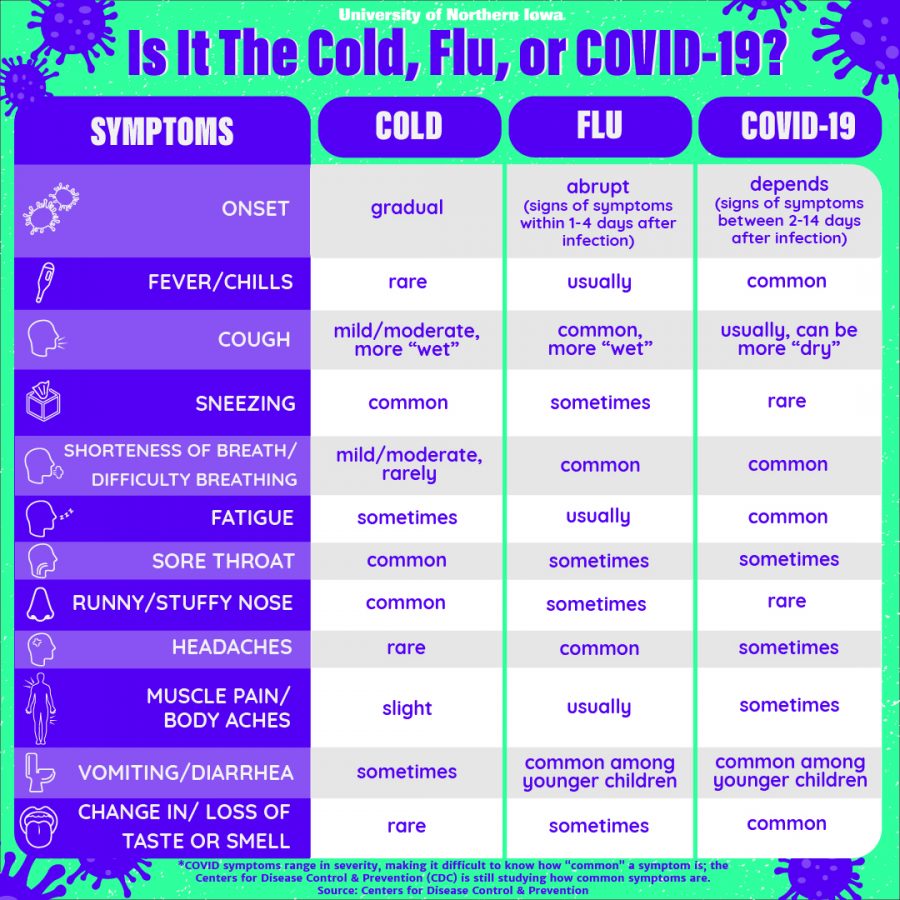Spread the word, not germs!
Student Wellness Services outlines symptom differences between the flu, cold and COVID-19.
Oct 1, 2020
Even though the cold, flu and COVID-19 are different illnesses, there are some common actions we all can take to protect ourselves and our fellow Panthers to reduce our risk from contracting and spreading them!
1. GET YOUR FREE FLU SHOT ON-CAMPUS!
According to the Centers for Disease Control & Prevention (CDC), the single best way to prevent seasonal flu is to get vaccinated each year. Get your flu vaccine early in the fall before flu season begins. Visit health.uni.edu to stay updated on the on-campus flu shot clinics! According to Dr. Disa Cornish, Associate Professor of Public Health at UNI, “Getting a flu shot is always important. This year, COVID-19 makes it extra important because of the risk of getting both the flu and coronavirus, or getting one right after the other. Both diseases are hard on the body, and getting hit with both could be disastrous. Getting a flu shot is one way to protect yourself from complications that could arise if you also get COVID-19.”
2. STAY HOME, REST AND STAY HYDRATED IF YOU ARE SICK
Avoid going to class, work, student organization meetings or other in-person meetings and keep your distance from others; this will help prevent spreading your illness to other students. According to the Centers for Disease Control & Prevention (CDC), it’s recommended that you stay at home for at least 24 hours after your fever is gone (without the use of medicine) except to obtain medical care or other necessities.
3. COVER COUGHS AND SNEEZES WITH TISSUE OR ELBOW
Serious respiratory illnesses like influenza can be easily spread by coughing or sneezing.
To help stop the spread of germs:
- Cover your mouth and nose with a tissue when you cough or sneeze
- Throw used tissues in the trash
- If you don’t have a tissue, cough or sneeze into your elbow, not your hands
4. KEEP YOUR ENVIRONMENT CLEAN!
Regularly clean and disinfect high-touch surfaces in household common areas, especially when someone is sick, such as: doorknobs, light switches, phones, desks, sinks, toilets, remotes, laptops. Visit the CDC’s website (cdc.gov) for more information on recommendations for proper disinfecting.
5. SEEK MEDICAL CARE IF SYMPTOMS BECOME WORSE THAN EXPECTED
If you have symptoms of the flu and are very sick or worried about your illness, contact a healthcare provider. Call 319-273-2009 to set-up an appointment with the UNI Student Health Clinic. Visit health.uni.edu for a list of off-campus providers.
6. AVOID TOUCHING YOUR FACE
Avoid touching your eyes, nose and mouth with unwashed hands. Avoid contact with those who are sick as much as possible.
7. WASH HANDS FREQUENTLY FOR AT LEAST 20 SECONDS
Wash hands frequently with soap and water OR use an alcohol-based hand sanitizer for at least 20 seconds. Make sure your hand sanitizer is at least 60% alcohol content. When using soap/water or hand sanitizer, it is important to rub all the surfaces of your hands (palms, backs, fingers, between your fingers, under your nails).
8. BUILD A RESILIENT IMMUNE SYSTEM BY PROACTIVELY TAKING CARE OF YOURSELF:
- Get 7-9 hours of sleep each night to promote healthy immune function and help fight off infections
- Eat a variety of fruits & vegetables
- Pursue regular joyful movement throughout the day (i.e. walking, running, biking, swimming)
- Effectively manage your stress; meet with a Wellness Coach to find healthy coping skills that work for you! Sign-up: https://studentwellness.uni.edu/wellness-coaching
- Decrease toxic chemicals that go into your body such as reducing consumption of alcohol and other drugs
- Drink plenty of fluids
9. PREPARE A “SICK KIT”
Prepare a “sick kit” to have on hand if and when illness strikes; you’ll thank yourself later! Useful items to include in your kit: soup, crackers, over the counter medicine, tea, sports drinks, sprite, thermometer, disinfectant wipes, hand sanitizer, washcloths, kleenex, nasal spray, cough drops, insurance card, number of UNI Student Health Clinic or family doctor, movie or book.
If we all do our part, we can Protect Our Panthers and reduce the spread of the cold, flu and COVID-19!







